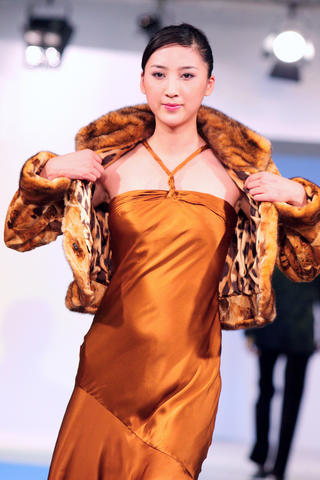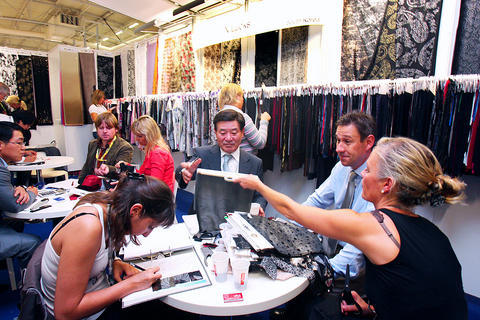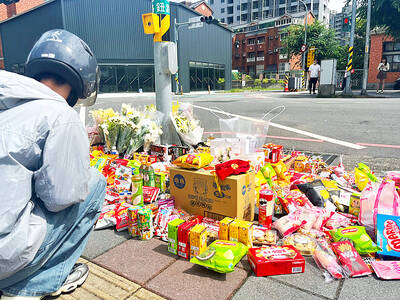With textile quotas about to expire, dozens of Chinese fashion firms are strutting their stuff jointly for the first time on Paris catwalks this week as Beijing attacks the high-end European market.
Making a debut appearance in the world's fashion capital, 82 clothing manufacturers from China descended on Paris for a four-day stint at a top trade fair, bringing their top models, including Miss Chinas 2003 and 2006, as well as the country's "most handsome man several years running," Zhang Xinghe.
From titillating G-string underwear to body-hugging evening gowns and trendy urban wear, 11 up-market labels were represented on the catwalk at the Texworld fabrics trade fair while dozens more showed cashmeres, fine silks and sportswear to 18,000 visiting buyers, some from France, the majority from across the continent.

PHOTO: AFP
"We must get to know each other better and reduce trade friction," said Du Yuzhou (杜鈺洲), head of the China National Textile and Apparel Council (CNTAC)."
Last October, China's Jefen fashion brand opened the march at the Paris women's ready-to-wear shows with a teen line of micro-bloomers and baby-doll dresses.
Speaking to reporters this week, Du said the country's fashion industry was putting the accent on producing high-end fashion apparel -- not the cheap-labor mass-produced gear generally associated with made-in-China goods.

PHOTO: AFP
"We are going upmarket, seeking not quantity but quality and innovation," he said. "We are looking at technological progress and creating labels. This will help encourage our companies to export."
The EU, whose quotas on Chinese textiles are finally to be dismantled at the end of the year, soaks up 15 percent of China's textile exports.
The country's 20 million textile workers produce US$561 billion turnover annually, a quarter for the export market.
"Textiles are of huge importance for our economy and for our export sector," Du said.
Star attraction at the fair, held on the eve of the Paris ready-to-wear shows, was what the Chinese call "soft gold" -- or cashmere.
"Our cashmere is the best in the world," proudly proclaimed Hei Liangjie, head of trade in the remote northern region of Ningxia bordering Mongolia, near the Gobi desert, whose six million people are mostly Muslim.
When cashmere prices rose steeply in the 1980s the region leapt in to consolidate its own raw material with raw cashmere purchased in Afghanistan, Pakistan, Iran and Mongolia, buying and selling at first before then realizing huge profits were to be made by also processing and producing cashmere goods.
Over time it has become the top producer of cashmere products in China, which itself accounts for 70 percent of global production.
Of the 20 million cashmere garments produced in Ningxia this year, 10 million were exported. One firm alone, Lingwu St Edenweiss, raises 350,000 goats a year.
"We are trying to develop our own labels aimed at the top-end market," Hei said. "The European market will be our biggest in the future."
Like cashmere, many of the Western-style products paraded on the catwalk boasted plus-size sales and production statistics.
Meters/bonwe, a late teens urban brand sporting skinny jeans and leather jackets, has 1,800 speciality stores in China. Smart Garments, which paraded evening furs and glittery get-up, produces more than a million pieces a year.
White Collar's smart evening wear reportedly receives 5,000 customers a day, and a flowing designer brand based on oriental trends called Exception de Mixmind has 60 outlets across China.
No wonder that the EU opted to extend textile quotas in 2005 -- exports of some items of Chinese clothing surged more than 500 percent when international quotas expired on Jan. 1, 2005.
"The levels of China textile exports following that liberalization were so great that EU companies did not have reasonable expectations of adjusting, hence the extension," a European Commission spokesman said.
"They will expire at the end of this year and they will not be replaced. We don't have the legal basis to replace them. The temporary extension was possible because when China entered the WTO in 2001 there was a clause in its agreement which enabled people to unilaterally re-impose quotas up until 2008," the spokesman said.
"In the end we didn't do it unilaterally, we negotiated it with China. But I don't imagine the Chinese are interested in renegotiating quotas and we are about to lose the main basis for unilaterally imposing quotas," he said.

Nvidia Corp yesterday unveiled its new high-speed interconnect technology, NVLink Fusion, with Taiwanese application-specific IC (ASIC) designers Alchip Technologies Ltd (世芯) and MediaTek Inc (聯發科) among the first to adopt the technology to help build semi-custom artificial intelligence (AI) infrastructure for hyperscalers. Nvidia has opened its technology to outside users, as hyperscalers and cloud service providers are building their own cost-effective AI chips, or accelerators, used in AI servers by leveraging ASIC firms’ designing capabilities to reduce their dependence on Nvidia. Previously, NVLink technology was only available for Nvidia’s own AI platform. “NVLink Fusion opens Nvidia’s AI platform and rich ecosystem for

WARNING: From Jan. 1 last year to the end of last month, 89 Taiwanese have gone missing or been detained in China, the MAC said, urging people to carefully consider travel to China Lax enforcement had made virtually moot regulations banning civil servants from making unauthorized visits to China, the Control Yuan said yesterday. Several agencies allowed personnel to travel to China after they submitted explanations for the trip written using artificial intelligence or provided no reason at all, the Control Yuan said in a statement, following an investigation headed by Control Yuan member Lin Wen-cheng (林文程). The probe identified 318 civil servants who traveled to China without permission in the past 10 years, but the true number could be close to 1,000, the Control Yuan said. The public employees investigated were not engaged in national

ALL TOGETHER: Only by including Taiwan can the WHA fully exemplify its commitment to ‘One World for Health,’ the representative offices of eight nations in Taiwan said The representative offices in Taiwan of eight nations yesterday issued a joint statement reiterating their support for Taiwan’s meaningful engagement with the WHO and for Taipei’s participation as an observer at the World Health Assembly (WHA). The joint statement came as Taiwan has not received an invitation to this year’s WHA, which started yesterday and runs until Tuesday next week. This year’s meeting of the decisionmaking body of the WHO in Geneva, Switzerland, would be the ninth consecutive year Taiwan has been excluded. The eight offices, which reaffirmed their support for Taiwan, are the British Office Taipei, the Australian Office Taipei, the

DANGEROUS DRIVERS: The proposal follows a fatal incident on Monday involving a 78-year-old driver, which killed three people and injured 12 The Ministry of Transportation and Communications yesterday said it would lower the age for elderly drivers to renew their license from 75 to 70 as part of efforts to address safety issues caused by senior motorists. The new policy was proposed in light of a deadly incident on Monday in New Taipei City’s Sansia District (三峽), in which a 78-year-old motorist surnamed Yu (余) sped through a school zone, killing three people and injuring 12. Last night, another driver sped down a street in Tainan’s Yuching District (玉井), killing one pedestrian and injuring two. The incidents have sparked public discussion over whether seniors